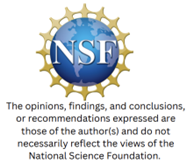NSF-HSI-Hubs Faculty Fellow
National Science Foundation (NSF) Hubs Hispanic Serving Institutions (HSI)
The NSF HSI-Hubs, “Intersectionality as Inquiry and Praxis: Race, Class, Gender and Ethnicity for Student Success in STEM," is a partnership between The University of New Mexico (UNM), New Mexico State University (NMSU), Central New Mexico Community College (CNM), City College, The City University of New York (CCNY-CUNY), Lehman CollegeCUNY and Hostos Community College-CUNY to catalyze enduring transformational equity. Our objectives are to:
- Re-envision data and equity metrics for generating policies for action and impact
- Convene communities of practice among faculty and other stakeholder communities
- Transform equity narratives in our strategic communications and publications
Grant Summary

Summary of Commitment(s)
Yearlong Communities of Practice with Faculty and Academic Leaders at UNM, NMSU, CNM:
UNM will lead the formation of a community of practice comprised of departments chairs, undergraduate chairs, faculty and other administrative academic leaders in the UNM College of Arts and Sciences STEM departments (e.g., math and statistics, biology, sociology, physics, economics, chemistry, psychology, etc.).
Faculty in each STEM department will be invited to apply to be a STEM HSI Intersectionality Faculty Fellow (STEM HSIIFF) that participates in a year-long community of practice on the possibilities of implementing intersectionality as critical inquiry and praxis in their respective HSI STEM departments/programs for advancing student success.
One to two faculty fellows from each department will be selected by advisory board members from each STEM department.
Each faculty fellow will receive:
$1,000 for participating in six meetings a year/three virtual meetings a semester and for committing to producing a 2-page policy brief that engages intersectionality as inquiry and praxis that is specific to their department. We will create two cohorts of 20 UNM, 15 CNM, 15 NMSU faculty fellows (1-2 faculty fellows/STEM department). The first meeting will be used to share insights about intersectionality as a conceptual and methodological tool as well as share the results from our intersectional quantitative analysis conducted during the first two years of the project. For example, the math and statistics department will be provided with data on how many first-generation college Latinx women/men, and
other students earned STEM degrees compared to their continuing generation college counterparts, between 2013 - 2023. Subsequent meetings will include invited speakers that will share their research and promising practices for operationalizing intersectionality as inquiry and praxis in STEM, followed by interactive breakout groups and continued engagement with speakers and other STEM HSIs.
Subsequent meeting topics will focus on Intersectionality as Inquiry and Praxis vis-a-vis:
1.) Teaching in STEM: Implications for Pedagogical Innovations
2.) Mentoring and Intersectional Collaborations
3.) Academic Program Review/Strategic Planning & Evaluation
4.) Research and Knowledge Production: Operationalizing Intersectionality in your NSF proposal
5.) Co-Curricular Activities/Internships and Workforce Career Beginnings
6.) Toward a Visioning Lab: How will we know that we have been successful? Short-term and Long-term Action Items, Accountability Structures at the Department and College Level.
The structure of these virtual meetings will be interactive and include 1-2 relevant readings/resources.
What You Can Find in the Faculty Fellow Application
Please note all applicants must be tenure track, tenured, college teaching faculty/ lecturer, and in a STEM Department.
The following questions will be on the application:
- First Name, Last Name
- Email Address
- Phone Number
- Department/Academic Unit
- Faculty Rank/Title (e.g., assistant professor, associate professor, full professor, lecturer, etc.,]
- Brief description of your interest with the grant (up to one page)
- Attach CV
- Please share information about additional faculty that might also be interested in this collaboration. Include name, email address, and department affiliation.
Process to Apply

Expectations
Each faculty fellow will receive $1,000 for the academic year, and will be expected to:
- Attend three meetings in Fall 2025 semester [virtual meetings]
- Attend three meetings in Spring 2026 semester [virtual meetings]
- Produce a 2-page policy brief that is specific to their department
Timeline of Application | Commitments of Dates
- Monday, November 4, 2024 | Application Opens
- Thursday, January 30, 2025 | Application Closes
- Week of February 3, 2025 | Review of applications
- Week of March 3, 2025 | Notification will be sent out
- Fall 2025/Spring 2026 Meeting Dates | TBD
- 3 Meeting per semester
“Intersectionality investigates how intersecting power relations influence social relations across diverse societies as well as individual experiences in everyday life. As an analytic tool, intersectionality views categories of race, class, gender, sexuality, nation, ability, ethnicity, age – among others – as interrelated and mutually shaping one another. Intersectionality is a way of understanding and explaining complexity in the world, in people and in human experiences (Collins & Bilge 2020:2).”